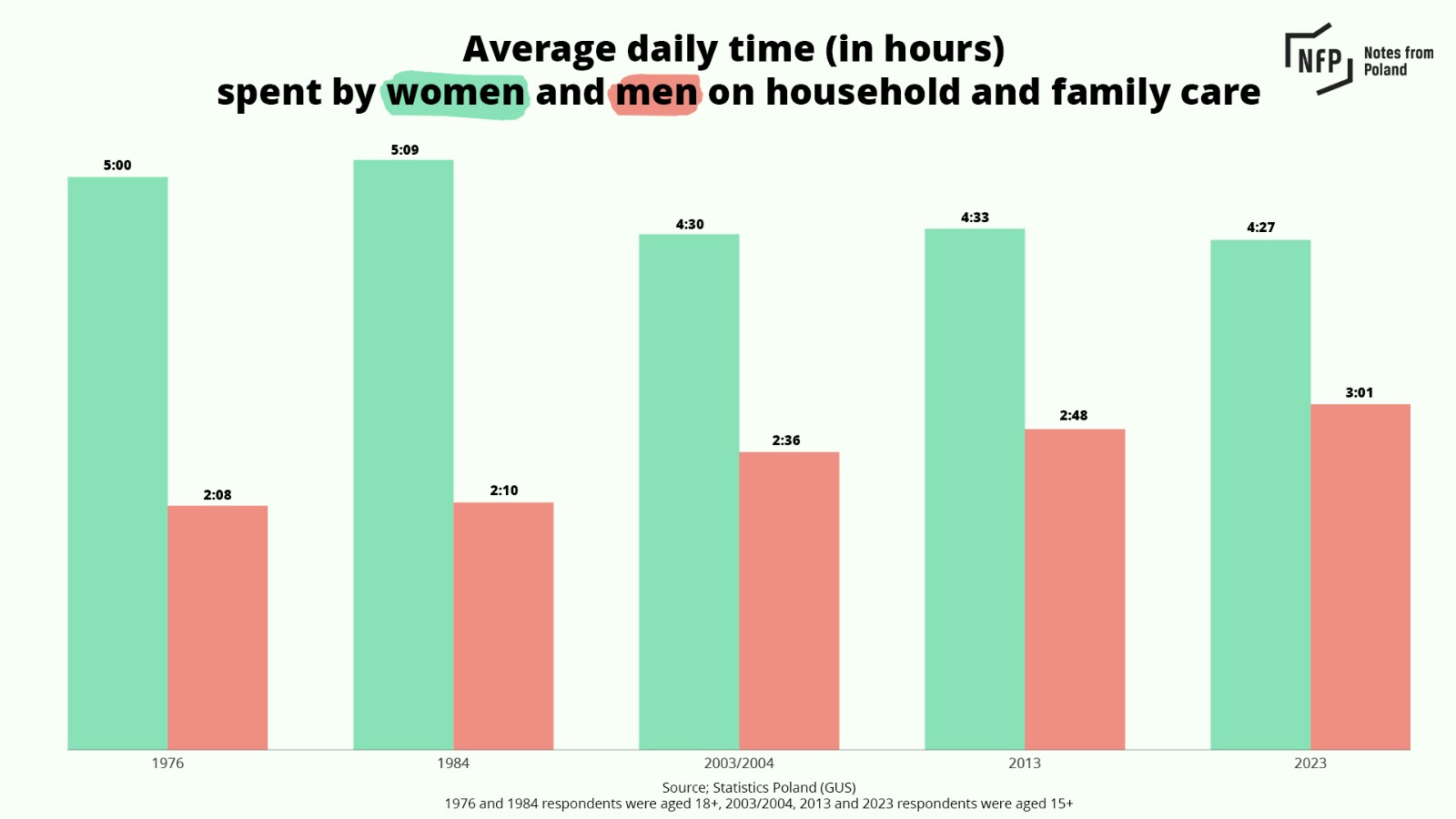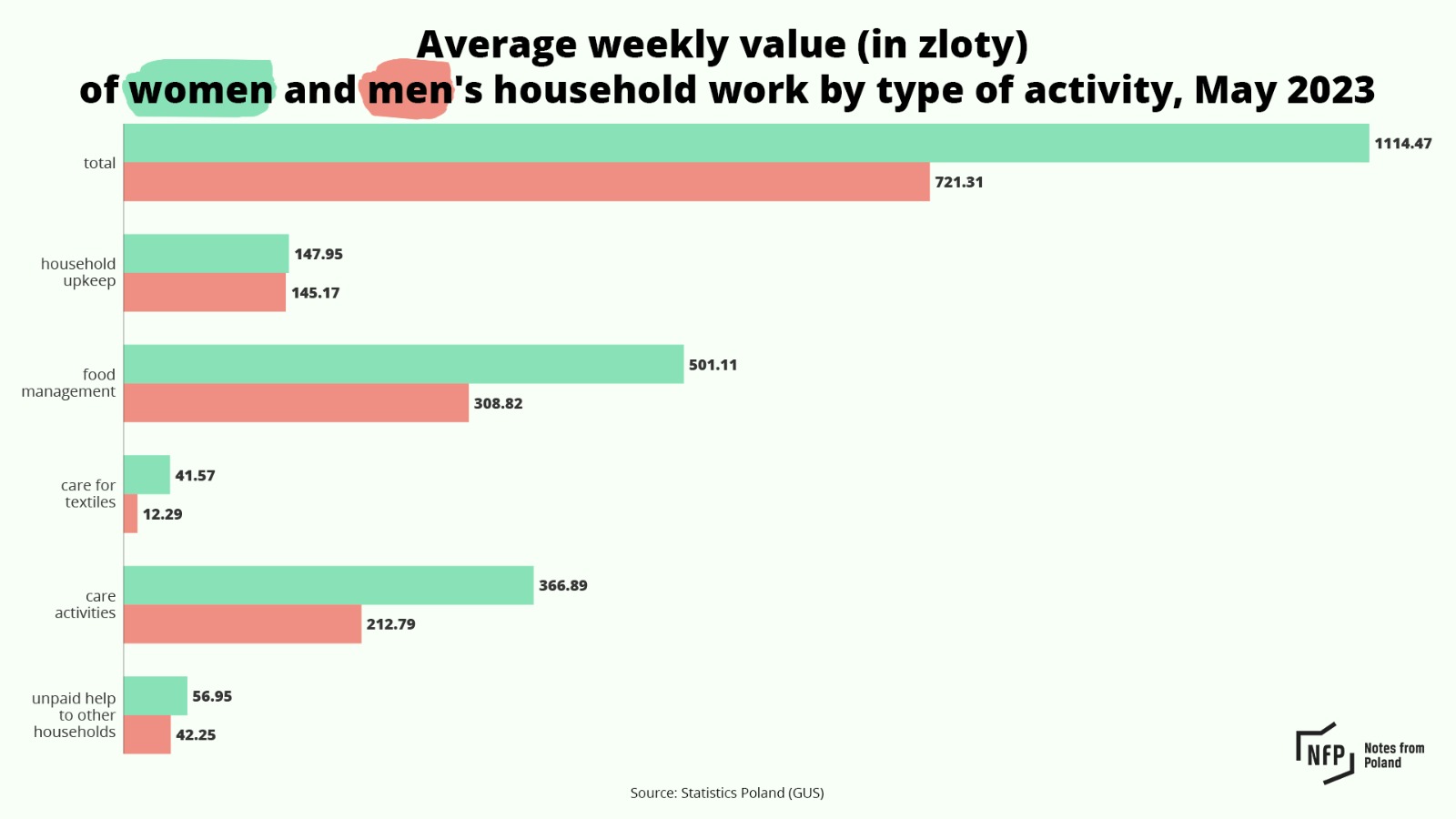Gender gap in unpaid domestic work narrows in Poland as men spend more time on chores

The gender gap in unpaid household labor in Poland has narrowed over the past decade as men spend more time on sickness, according to new data from Statistics Poland (GUS), a state agency. However, women still perform the majority of such tasks.
In 2023, men spent an average of 3 hours and 1 minute per day on unpaid household work and family care. That was 13 minutes more than in 2013 and almost an hour more than when the study was first conducted in 1976.
Meanwhile, women spent an average of 4 hours and 27 minutes per day on such tasks in 2023, a similar level to 2013 and 2003 but down from the five hours or more recorded in 1984 and 1976.
Women spend 18% of their day on unpaid household work and caregiving compared to 11.2% for men. But men devote more time to paid work (16.4% vs 10.1% for women). When combined, the total daily time spent on both paid and unpaid work is nearly equal – 28.1% for women and 27.6% for men.

As a result of men's growing contribution over the last decade, the gender gap in GUS's estimated economic value of unpaid labor fell significantly. In 2013, women's contribution was valued at 73.5% more than men's, which fell to 51.7% by 2023.
“This is the result of social and cultural changes that have taken place in recent decades,” noted GUS in its report on the new data.
“While traditionally housework was mainly the domain of women, nationwide studies of how people spend their time, conducted since the late 1970s, show a steady increase in the percentage of men doing housework.”

The figures come from GUS's Time Use Survey , which is based on diaries completed by more than 55,000 individuals across over 24,000 households in Poland. Participants recorded their activities over two days – one weekday and one weekend day – using ten-minute time intervals.
The agency calculated the value of unpaid domestic work by multiplying the time spent on specific household tasks by the market hourly rates for equivalent paid work. According to GUS, the overall average monthly value of unpaid work was 3,993 zlotys (€932), or 56% of the national average salary in 2023.
Women's unpaid work was valued higher than men's across all categories, averaging PLN 4,727 per month (66% of the average gross salary), compared to PLN 3,035 (42%) for men.
Women even outperformed men in household upkeep, which, as well as cleaning, also includes tasks such as construction, vehicle repairs and home renovations that are more often performed by men.
Such work carries higher market rates, bringing men's estimated value in this category close to that of women, despite spending less time on it overall.
The only exception in that category was unemployed men, whose weekly value of household upkeep (PLN 198) was higher than that of unemployed women (PLN 169).
Poland is the fifth best country in the world for female entrepreneurs, and the best in the EU, according to the latest Index of Women Entrepreneurs.
It has risen 11 places from its position in last year's ranking https://t.co/acCThIbC82
— Notes from Poland 🇵🇱 (@notesfrompoland) November 24, 2020
Despite shifts in the value and structure of household production over the last decade, the share of unpaid household work relative to Poland's GDP has remained broadly stable since 2013, at around 40%, notes Central Statistical Office.
In 2023, total household production was estimated at 2.6 trillion zlotys, with 1.8 trillion classified as non-market output. Market household production – which includes work intended for sale – is already counted in GDP figures; unpaid household labor is not.
“Such large volumes of non-market domestic production should not be overlooked in official public statistics. Although not traded in markets, they are essential components of social and economic life,” Central Statistical Office said.
Commenting on the new data, the Polish Economic Institute noted that “quantifying domestic work in monetary terms allows us to see its scale, but it does not fully reflect its essence and value” as it is “only an approximate indicator of time and effort and ignores altruism, care and a sense of responsibility for loved ones.”
📢 Next report from the Polish Economic Institute is now fully available online!
🏠 In most Polish families with young children, mothers still do the majority of housework.
🧹 36% of women are dissatisfied with the division of duties—over 3x more than men.
👶 A fairer split… pic.twitter.com/hZvoTAnEBg
— Polish Economic Institute (@PIE_NET_PL) July 21, 2025
Main image credit: Ketut Subiyanto/Pexels
notesfrompoland




